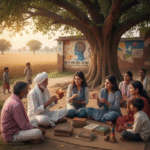Blending Ancient Teachings with Contemporary Ideals to Create a New Intellectual Paradigm
Lucknow – Uttar Pradesh, the land of timeless spiritual traditions, continues to play a pivotal role in shaping modern philosophical discourse. Drawing from its deep roots in Vedic teachings, Bhakti poetry, and Sufi mysticism, the state offers a unique perspective on contemporary challenges. Whether addressing global environmental crises, social inequality, or the search for inner peace, Uttar Pradesh’s ancient wisdom is increasingly influencing modern thought.
This convergence of tradition and modernity highlights the enduring relevance of the region’s cultural and intellectual heritage.
Key Metrics Reflecting Uttar Pradesh’s Philosophical Influence
- Cultural Significance: With 25 UNESCO-recognized heritage sites, including Varanasi and Sarnath, Uttar Pradesh remains a hub for global philosophical inquiry (UNESCO).
- Spiritual Tourism: In 2022, the state welcomed 535 million domestic and 5 million foreign visitors, drawn by its spiritual and intellectual heritage (UP Tourism Department, 2023).
- Educational Reach: Institutions like Banaras Hindu University (BHU) integrate traditional and modern philosophies, influencing global academic thought.
- Environmental Efforts: Programs like Namami Gange align ancient reverence for rivers with modern sustainability goals, setting global benchmarks for ecological restoration.
Philosophical Foundations of Uttar Pradesh’s Influence
1. Vedic Philosophy and Ecological Ethics
The Vedic texts emphasize harmony between humans and nature, offering timeless principles for sustainable living.
- Modern Application: The Namami Gange Mission embodies this philosophy by prioritizing river rejuvenation and pollution control.
- Global Relevance: The concept of ecological balance, rooted in Vedic thought, resonates with modern environmental movements worldwide.
2. Bhakti Movement and Social Equity
The Bhakti saints, including Kabir and Tulsidas, challenged caste hierarchies and promoted equality and inclusion.
- Impact on Modern Thought: These teachings influence contemporary social justice movements, inspiring efforts to dismantle systemic discrimination.
- Case Study: Community-led initiatives in Purvanchal emphasize equitable resource distribution, reflecting Bhakti ideals.
3. Sufi Mysticism and Interfaith Harmony
The Sufi tradition in Uttar Pradesh underscores love, unity, and coexistence, transcending religious boundaries.
- Relevance Today: Shrines like the Dargah Sharif in Bareilly serve as centers for interfaith dialogue, offering lessons in peacebuilding amidst global polarization.
Modern Philosophical Discourses Influenced by Uttar Pradesh
1. Mindfulness and Mental Well-Being
The global rise of mindfulness practices finds its roots in Uttar Pradesh’s spiritual traditions, particularly in the teachings of Buddha at Sarnath.
- Adoption Globally: Techniques like meditation and yoga, promoted globally, draw heavily from Uttar Pradesh’s heritage.
- Local Revival: Wellness centers in Varanasi and Ayodhya are adapting these practices for urban lifestyles, making ancient wisdom accessible to modern audiences.
2. Gender Equality and Empowerment
While traditional roles in Uttar Pradesh were patriarchal, reinterpretations of ancient texts highlight the contributions of women in society.
- Policy Impact: Programs like Mission Shakti align with global feminist philosophies while drawing inspiration from local traditions of resilience and leadership.
3. Decentralized Governance and Community Resilience
Gandhian ideals of self-reliance, deeply rooted in Uttar Pradesh’s rural governance structures, influence modern concepts of participatory democracy.
- Practical Examples: The state’s Panchayati Raj system reflects a blend of traditional and modern governance models, emphasizing collective decision-making.
Challenges in Harmonizing Tradition and Modernity
- Cultural Misinterpretations: Ancient philosophies are sometimes oversimplified or commodified, diluting their original intent.
- Generational Gaps: Younger populations often prioritize global trends over traditional wisdom, risking cultural disconnection.
- Resource Disparities: Urban centers like Noida adopt global philosophies more readily, while rural areas face barriers to integrating modern ideas with traditional practices.
Pathways for Integration and Growth
1. Revitalizing Educational Curricula
- Action: Introduce multidisciplinary programs that blend Vedic, Bhakti, and Sufi philosophies with modern disciplines in schools and universities.
2. Expanding Cultural Exchange Programs
- Example: Promote international collaborations through institutions like BHU, highlighting Uttar Pradesh’s role in shaping global thought.
3. Enhancing Digital Documentation
- Impact: Leverage technology to preserve and disseminate Uttar Pradesh’s philosophical heritage to a global audience.
Conclusion
Uttar Pradesh’s traditional wisdom, rooted in timeless teachings, continues to inspire and reshape modern philosophical thought. By harmonizing its spiritual and cultural heritage with contemporary challenges, the state not only preserves its identity but also contributes meaningfully to global discourse.
As the world looks for answers to pressing issues like inequality, mental health, and environmental crises, Uttar Pradesh’s blend of ancient and modern philosophies offers a blueprint for sustainable progress and collective well-being.













